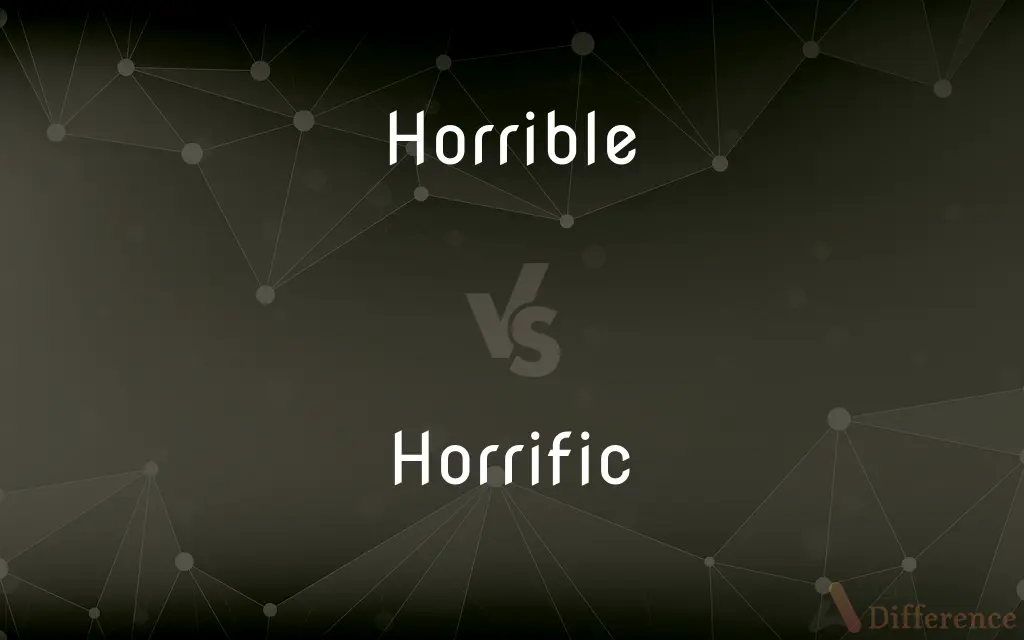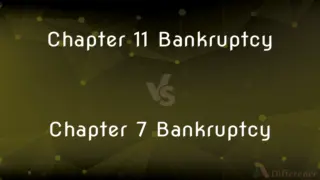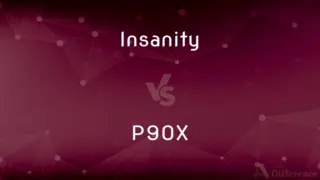Horrible vs. Horrific — What's the Difference?
By Tayyaba Rehman & Fiza Rafique — Published on February 15, 2024
"Horrible" describes something very unpleasant or bad, while "horrific" implies causing horror, often used for things that are shockingly dreadful or frightening.

Difference Between Horrible and Horrific
Table of Contents
ADVERTISEMENT
Key Differences
The words "horrible" and "horrific" both convey negative sentiments but differ in intensity and context. "Horrible" is often used to describe something that is very unpleasant, causing discomfort or dislike. It can refer to a wide range of situations, from minor inconveniences to more serious matters, but it doesn't necessarily imply fear or terror. For example, a horrible taste refers to something that is very unpleasant to the palate, and a horrible day might mean a day filled with various troubles or annoyances.
"Horrific," on the other hand, carries a stronger connotation, typically associated with causing horror or shock. It is used to describe situations or events that are terrifying and shockingly dreadful, often involving violence or disaster. For instance, a horrific accident implies a level of severity and tragedy that evokes fear and shock, and a horrific scene might involve something that is visually terrifying and disturbing.
In terms of usage, "horrible" can be applied more broadly to various unpleasant experiences or qualities, ranging from taste and smell to personality traits and general situations. "Horrific" is more commonly used in contexts involving fear, shock, and extreme negativity, often related to events or actions rather than general unpleasantness.
While both adjectives describe negative aspects, the choice between "horrible" and "horrific" depends on the degree of unpleasantness and the specific context. "Horrible" might be used for situations that are highly undesirable or of poor quality, while "horrific" is reserved for circumstances that are not only undesirable but also shocking and capable of inducing a strong emotional reaction, such as fear or horror.
In summary, while "horrible" and "horrific" are both used to describe negative states, "horrible" is less intense and more versatile, applicable to a range of unpleasant situations, whereas "horrific" implies a greater intensity, often associated with fear, shock, and situations that are extremely distressing or terrifying.
ADVERTISEMENT
Comparison Chart
Intensity
Less intense, very unpleasant
More intense, shockingly dreadful
Context
Broad usage for unpleasant situations
Used for situations causing horror or shock
Examples
Bad taste, terrible experience
Gruesome accidents, terrifying events
Emotional Response
Discomfort, dislike
Fear, shock
Usage in Sentences
"The soup had a horrible taste."
"The news reported a horrific accident."
Compare with Definitions
Horrible
Extremely unpleasant or bad.
The weather today is absolutely horrible.
Horrific
Resulting in extreme fear or disgust.
They found themselves in a horrific dilemma.
Horrible
Used to express dismay or concern.
What a horrible thing to say!
Horrific
Extremely bad or unpleasant.
The aftermath of the storm was horrific.
Horrible
Of poor quality; very disagreeable.
The performance was simply horrible.
Horrific
Causing horror; shockingly dreadful.
The documentary exposed horrific living conditions.
Horrible
Deserving or inciting hatred.
He was known for his horrible temper.
Horrific
Involving or resembling a horror movie.
The haunted house offered a horrific experience.
Horrible
Causing or likely to cause discomfort.
I have a horrible feeling about this.
Horrific
Terrifying; horrifying.
The news reported a horrific incident downtown.
Horrible
Arousing or tending to arouse horror; dreadful
"War is beyond all words horrible" (Winston S. Churchill).
Horrific
Causing horror; terrifying.
Horrible
Very unpleasant; disagreeable.
Horrific
Horrifying, causing horror; horrible.
Horrible
A thing that causes horror; a terrifying thing, particularly a prospective bad consequence asserted as likely to result from an act.
Horrific
Causing horror; frightful.
Let . . . nothing ghastly or horrific be supposed.
Horrible
A person wearing a comic or grotesque costume in a parade of horribles.
Horrific
Grossly offensive to decency or morality; causing horror;
Subjected to outrageous cruelty
A hideous pattern of injustice
Horrific conditions in the mining industry
Horrible
Causing horror; terrible; shocking.
Horrific
Causing fear or dread or terror;
The awful war
An awful risk
Dire news
A career or vengeance so direful that London was shocked
The dread presence of the headmaster
Polio is no longer the dreaded disease it once was
A dreadful storm
A fearful howling
Horrendous explosions shook the city
A terrible curse
Horrible
Tremendously bad.
Horrible
Exciting, or tending to excite, horror or fear; dreadful; terrible; shocking; hideous; as, a horrible sight; a horrible story; a horrible murder.
A dungeon horrible on all sides round.
Horrible
Provoking horror;
An atrocious automobile accident
A frightful crime of decapitation
An alarming, even horrifying, picture
War is beyond all words horrible
An ugly wound
Common Curiosities
Which word would describe a very bad taste, "horrible" or "horrific"?
"Horrible" is more appropriate for describing taste.
Is "horrible" suitable for describing fear-inducing situations?
"Horrible" can describe fear-inducing situations but is less intense than "horrific."
Can "horrible" and "horrific" be used interchangeably?
While sometimes used similarly, "horrific" implies greater intensity and is associated with horror, unlike "horrible."
Can a movie be described as "horrible" and "horrific"?
Yes, depending on context: "horrible" for quality, "horrific" for content.
Is "horrific" used for dramatic emphasis?
Yes, "horrific" can dramatically emphasize the severity of a situation.
Can a situation be "horrible" without being "horrific"?
Yes, many situations are "horrible" without reaching the intensity of "horrific."
Can "horrible" express mild dissatisfaction?
Yes, "horrible" can express a range from mild to strong dissatisfaction.
Are "horrible" and "horrific" synonymous with "terrible"?
Both can be similar to "terrible" but carry unique connotations of unpleasantness and horror, respectively.
What's a "horrific" event?
An event causing extreme horror, shock, or fear, like a natural disaster.
Can weather be described as "horrific"?
Typically, "horrific" is used for more severe scenarios than bad weather unless the conditions are truly disastrous.
Would a small mistake be called "horrible" or "horrific"?
A small mistake would more likely be "horrible" as "horrific" implies greater severity.
Which word is stronger, "horrible" or "horrific"?
"Horrific" is generally stronger and implies shock or horror.
Is "horrific" only used in extreme conditions?
Generally, yes, "horrific" is reserved for situations that are extremely severe, shocking, or terrifying.
How do "horrible" and "horrific" relate to horror movies?
"Horrific" is more closely related to the content of horror movies, while "horrible" might refer to the movie's quality.
Can "horrible" imply danger?
While it can imply a negative situation, "horrible" doesn't inherently suggest danger as strongly as "horrific."
Share Your Discovery

Previous Comparison
Chapter 11 Bankruptcy vs. Chapter 7 Bankruptcy
Next Comparison
Insanity vs. P90XAuthor Spotlight
Written by
Tayyaba RehmanTayyaba Rehman is a distinguished writer, currently serving as a primary contributor to askdifference.com. As a researcher in semantics and etymology, Tayyaba's passion for the complexity of languages and their distinctions has found a perfect home on the platform. Tayyaba delves into the intricacies of language, distinguishing between commonly confused words and phrases, thereby providing clarity for readers worldwide.
Co-written by
Fiza RafiqueFiza Rafique is a skilled content writer at AskDifference.com, where she meticulously refines and enhances written pieces. Drawing from her vast editorial expertise, Fiza ensures clarity, accuracy, and precision in every article. Passionate about language, she continually seeks to elevate the quality of content for readers worldwide.
















































